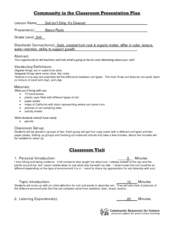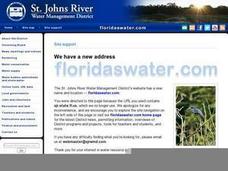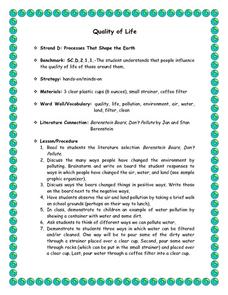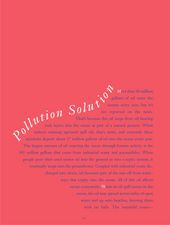Curated OER
Water Pollution
Here is a fine lesson for fifth graders that will give them an idea of the variety of impacts that human-introduced pollutants have on the environment. After an initial class discussion and teacher-led demonstration, pupils brainstorm...
San Francisco Public Utilities Commission
Let's Save Water: Water Conservation
Did you know that cutting down your shower by one minute a day can save five gallons of water? Learn about water conservation with a science reading activity. After kids finish reading key terms and water-saving tips in a reading...
Curated OER
The Wonders of Water - Biology Teaching Thesis
Students name 3-5 aesthetic values of the Potomac River. They state the importance of water in their own words. Students describe what Earth Day is and why it is important. They list 5-7 ways that they can help minimize water pollution.
San Francisco Public Utilities Commission
Recycled Water: A Smart Way to Reuse Water
Learn about wastewater and recycled water with a science reading activity. After learners finish a two-page passage about conserving the water supply, they answer six comprehension questions about what they have read.
Earth Day Network
Staying Green While Being Clean
Clean up the environment with a lesson plan that focuses on replacing hazardous cleaning supplies with green, environmentally-friendly products. Using a dirty patch of surface as a control area, kids clean other parts of various surfaces...
Curated OER
Muddy Waters
Students read the book the Dirt Boy. In this design and problem solving lesson plan, students create a way to clean muddy water. Students give their ideas and discuss them. The teacher shows a filter and demonstrates what it does to the...
Curated OER
Soil Isn't Dirty; It's Diverse!
Second graders participate in a soil activity. In this soil instructional activity students complete a worksheet describing different soil types and the organic and inorganic things found in them.
Curated OER
Lesson 11 - Potable Water
Students investigate the meaning of potable water and water reuse. They define water quality and quantity problems. They complete worksheets, a quiz and design a poster.
Curated OER
Quality of Life
Learners discover that people influence the quality of life of those around them. They read the literature selection 'Berenstein Bears, Don't Pollute' and discuss the many ways people have changed the environment by polluting.
Curated OER
Water Pollution
Fifth graders observe and record what happens when household products are added to a tank of water to depict water pollution. They brainstorm ideas of how to clean the contaminate out of the water before watching demonstrations of...
University of Wisconsin
Conjunction Function
As part of a unit, this lesson familiarizes youngsters with components of a rain garden. They speculate about the role of an assigned component in contributing to a rain garden, and ultimately, in the health of the local watershed. Each...
Curated OER
Water Quality Monitoring
Students comprehend the four parameters of water quality. They perform tests for salinity, dissolved oxygen, pH and clarity or turbidity. Students comprehend why scientists and environmental managers monitor water uality and aquatic...
Curated OER
What's in the Water?
Students examine how pollutants can affect ocean animals. In this pollution lesson, students read a story about the ocean floor, think about what would happen to the plants and animals if the ocean became dirty or polluted, and conduct...
Curated OER
Keep the Environment Clean
Students discuss ways our environment becomes polluted. They make a list of ways to keep it clean.
Curated OER
Pollution Solutions
Young scholars participate in a hands-on activity to determine how water is polluted and investigate steps in how to treat water. Students try to produce the cleanest water possible using the materials provided.
Curated OER
Beaches-Clean or Dirty
In this reading comprehension worksheet, students read a 7 paragraph selection regarding the cleanliness of beaches and respond to 2 short answer questions.
Curated OER
Kitchen Cleaners
Students, in groups, select two cleaning agents that they feel solves their cleaning problem.
SF Environment
Pre-School Composting and Recycling!
You can never be too young to get involved in composting or recycling. Here is a lesson that has been made for the very littlest learners and it's all about the importance of conservation. They'll sort compostable and recyclable objects,...
Curated OER
Pioneer Kitchen
In this pioneer worksheet, students read a short passage about different ways of pioneer cooking. Students then find 12 given words in the word search provided.
Curated OER
Landscape Picture Map
Students explore pollution of water sources. In this ecology activity, students define and identify natural resources. Students use map skills to locate local rivers and lakes used for recreation. Students brainstorm ways in which to...
Curated OER
Pollution Solution!
Students listen to the story "Clean Air, Dirty Air" by Lynne Patchett and discover the main types of pollution and how these affect their bodies. In this pollution lesson, students work in small groups to create a machine to prevent...
Polar Trec
Is There Salt in a Glacier?
What can conductivity tell us about a glacier? Groups analyze glacial melt to determine salt content through an analysis of the pH and conductivity measurements of two samples. Groups then determine the source of the salts.
Curated OER
Natural Cleaners
Students explore natural cleaners. In this science lesson plan, students gain an understanding of the effects that commercial cleaners have on the environment and teach them to make their own cleaners out of less hazardous materials.
Curated OER
Bowl of Love Lesson 6
Students study the concept of having a fundraiser to benefit a local soup kitchen. In this fundraising service project instructional activity, students participate in different activities that explain the history and making of clay...

























